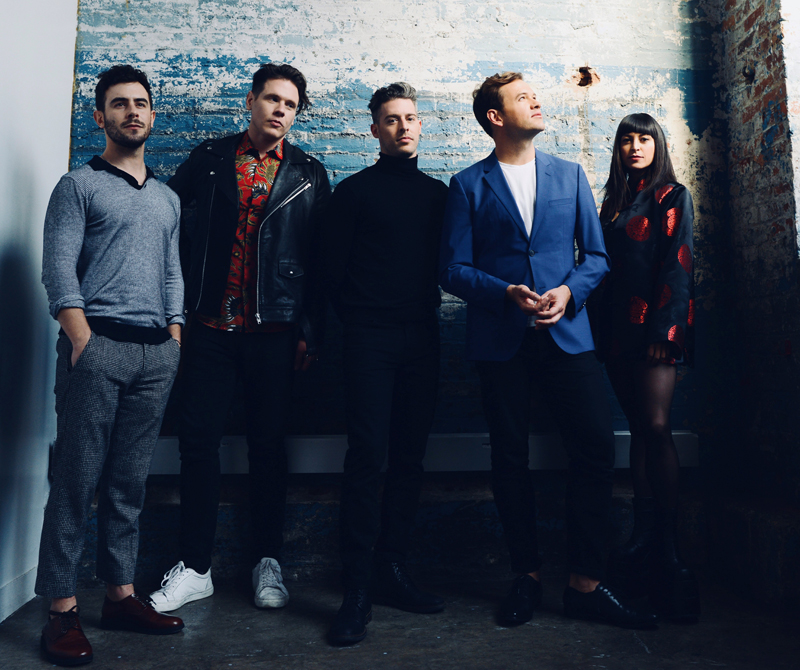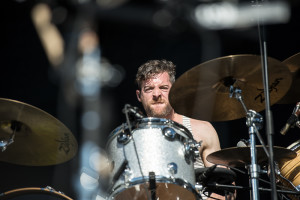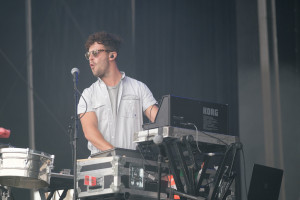INTERVIEW: St. Lucia searches for the gods, holds out for a brighter future

St. Lucia. Courtesy: Shervin Lainez.
Jean-Philip Grobler still dreams of having the biggest band in the world. The St. Lucia frontman acknowledges that the time may not be right for his earnest, heart-on-sleeve pop music. Even when he was in the middle of writing his band’s third record, Hyperion, there were times when he questioned what he was doing and whether it would be his last St. Lucia record.
St. Lucia
The Night Game
8 p.m., Sunday & Monday, Oct. 14-15
August Hall
Tickets: $35.
“With the first record [2013’s When the Night], we were part of this hype bubble. There was this massive growth that had happened from when the album was released to when we did our last tour,” he said last week, one day before Hyperion’s release. “The last album grew as well. But with this one, it seems that the scene that we came up with sort of died a little bit.
“How do we break away from this idea of being just this synth-pop band, you know?” he said.
Where to take St. Lucia following its bombastic sophomore album, 2016’s Matter, weighed heavily on Grobler’s mind. He had to accept that the music that made his band successful in 2013 was no longer the sound that was pushing the industry forward. Nor was he willing to change for the sole purpose of making what was popular.
After overcoming bouts of doubt, he is again confident in the music St. Lucia created. He said it’s the best the band—which includes keyboardist-vocalist Patti Beranek (Grobler’s wife), bassist Ross Clark, drummer Dustin Kaufman and keyboardist Nick Paul—has ever made.
“We’re in this time, now, like, when mammals were small and scurrying around and had to be clever to find ways to survive while the dinosaurs were big and roaming the earth,” he said. “At some point the current dinosaurs will die out as well, and the mammals will rule the earth again.”
Grobler will be ready for the time when pop music is considered high art again.
Life changes for St. Lucia
Toward the end of the Matter tour, Grobler and Beranek found out she was pregnant, but they lost their child one month into the pregnancy.
“I know that happens often, but it was difficult in certain ways,” Grobler said.
The pregnancy changed both of their mindsets, and Grobler said he became more thoughtful and considerate about the future of the world, especially after finding out that Beranek was again pregnant. The making of Hyperion coincided with the pregnancy, though the former ended up taking more than nine months.
“There’s something about having a kid come into the world, and thinking of the example I’m going to be setting for him in the future, made me really think about what I’m saying with my lyrics, how I’m recording, and the intention behind everything,” he said. “It’s less, like, trying to be perfect. There’s more imperfections in it. … It stretches a little more, and has more room. It feels a little more alive.”
There is one “baby” song on Hyperion. Grobler wrote album-opener “Bigger” to his future child, who was not yet conceived (their son, Indy, was born in December 2017).
There are plenty of songs voicing Grobler’s concerns, as well as hopes.
The harpsichord-like synths of “Gun” put a candied sheen over a story that both examines gun control in America and serves as a metaphor for power relations between men and women. Several songs touch on how Americans are so divided and live in their own echo chambers of ideologies. Of course, they’re so energetic that people can dance to them, anyway.
The more positive themes are about staying hopeful in negative times, and finding personal spirituality. Cuts like “Paradise is Waiting” and “Brighter Love” are about a pilgrimage of sorts.
“[They’re] like, a vision quest, in a way, of trying to find a connection with one’s deeper self and connection with the deeper side of the world,” Grobler said. “A lot of music and art, I realized, is kind of ironic or negative, or kind of nihilistic right now. … I’m not any specific religion, but … I have a spiritual element to my life. I don’t know what that is. I don’t know what God is. But there is this deep longing, or deep questioning that I think all humans have in them that you can’t quite answer by reciting an algorithm.”
Hopeful science fiction
What’s in a cover?
“To me the cherry blossom is romantic and exotic. It’s this beautiful flower from Japan that blooms in the spring. It symbolizes rebirth. … It’s one of the first plants that blossoms in the spring. It’s one of the first signs of warming up again, and the world coming back to life. I feel, in a way, this record is like a rebirth for us. I feel it’s quite different to the other records. There’s a lot of exoticism in it. You think of ‘Tokyo,’ you think of ‘China Shop.’ St. Lucia has always represented this idea of escape and being somewhere exotic. Not in a tourist kind of way, but that feeling of being outside of yourself and outside of your normal reality—being somewhere where everything is once again refreshed and amazing to you. …
We light candles in our apartment almost every night. It gives that feeling of romance, and we also associate it with being in a church. It’s reverence or worship in a way. That’s how I approach music. It’s this very high art—even though I’m making pop music, which a lot of people think as the lowest form of musical art. Most of my favorite music has some form of pop to it. I think there is something beautiful about communicating to a wide group of people without cynically aiming at trying to appeal to them.”
The other big influence on the St. Lucia record is the Hyperion Cantos book series, penned by Dan Simmons, which Grobler had been devouring at the time. The future-set stories have a hopeful tint that appealed to the artist.
“To me, all the great works of art … [have] this subconscious message or story that’s going on in there that links to some core human truths,” Grobler said. “[The book series] explores so many corners of being a human and humanity; where we can potentially go.
“There’s this one storyline where an older guy has a daughter and she starts to age backward. And he goes on this pilgrimage to Hyperion to cure her of this sickness. It’s a sad and desperate story, but there was something about that that really inspired me.”
Grobler then found out that in mythology, Hyperion was the Greek deity, descended from the original Greek gods, who father the sun, the moon and the dawn. The sun and the moon interacted to make the day and night, with which Grobler found a connection because of his attempts to balance light and dark in his own music.
“When The Night, which everyone calls a tropical happy synth-pop record; toward the end it … becomes darker in its hue,” he said. “I think Matter has the same thing. I think this record has it. I’m always trying to balance the two extremes of my personality and project them into the music.
Handclaps and whoops
Grobler’s difficulties writing the songs that would comprise Hyperion started early, after he decided to try something that had worked for him before. For Matter, he co-wrote four songs with collaborators like Jack Antonoff. He was proud of and felt a personal connection to all four.
When he tried the same exercise this time around, he came away dejected, having other writers tell him and Beranek that they needed to sound like other acts to be successful.
“I know that a lot of great pop music is made that way, but to me, the music I make comes from a different place; a deeper place,” he said. “I’m not trying to make a song that sounds like Phoenix, or make a song that sounds like Daft Punk. It bubbles out of some place in the universe.”
The songs that came from these one-day sessions didn’t feel right to the St. Lucia frontman, nor was he able to connect with them. People told him to make the songs more “fun,” or to add “whoops,” “heys,” “handclaps” and “footstomps.”
Grobler thought that would underestimate his fans’ intelligence. He compared the ingredients of songs to the ingredients in good, nutritious food.
“I want to make something that isn’t emotionally manipulative of people; that’s not trying to make them feel a certain way—that is truthful and honest about who I am and who our band [is] and who we are as people,” he said. “Hopefully, a byproduct of that is that it makes people feel something.”
The next St. Lucia record
Jean-Philip Grobler no longer feels like Hyperion is his final record as St. Lucia. At his lowest point in the making of the album, he was frustrated that some in the industry, like critics, weren’t taking his music seriously, and when he felt like pop music stopped being about being truthful and inspiring others.
“I take what I do very seriously, and I didn’t know how to bridge that gap,” he said. “I felt like what I was trying to make was so at-odds with where the music world is heading. Sometimes I wondered if it was even possible. It’s like climbing up a sheer rock face and not seeing another ledge to hang off of.”
He got over that by worrying about only looking for one handhold at a time. Eventually they began to present themselves. He got over the hump. To use another analogy:
“You’re floating in the ocean and you see a bit of land, and you gradually head toward the land.”
Follow editor Roman Gokhman at Twitter.com/RomiTheWriter. Follow photo editor Alessio Neri at Instagram.com/windowofcolor.





